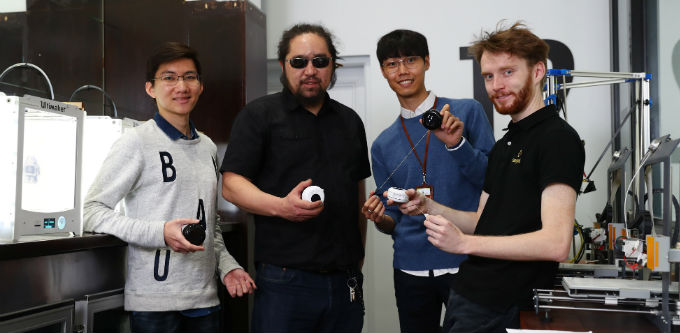
OSeyerise founders Yuma Antoine Decaux (second from left) and Jake Dean (right). Source: Supplied.
They’ve developed a digital tape measure, secured seed funding, and taken home the national James Dyson award, but the founders of OSeyeris are aiming even higher, creating a stargazing app for the visually impaired.
Founded by University of Queensland engineering students Jake Dean and Yuma Antoine Decaux, who lost his sight in 2009, OSeyeris was developed through the university’s iLab Germinate accelerator.
The startup’s first product, the Macaron, was born when Decaux was renovating his home.
When it came to taking measurements, “I couldn’t find a way to do it independently”, he tells StartupSmart.
The Macaron is a bluetooth-enabled, smart tape measure, combining robotics with sleek design and user experience, and allowing people with vision impairments to measure accurately.
However, it’s also arguably more efficient than using a traditional tape measure, and has proven useful to sighted people as well, the founders say.
The pair developed the Macaron through the iLab accelerator, and in September this year, OSeyeris was named national winner of the James Dyson award for the product.
Dean calls the win a “big validation”.
Building hardware can be arduous, he says, with revisions to the technology taking significantly longer than they would with software.
Winning the award let the founders know “we’re heading in the right direction”, Dean says.
“It means it is meaningful to someone.”
There’s also a certain poignancy about winning this particular award, Decaux says.
“We all know the backstory of James Dyson,” he says.
Dyson went through “thousands of iterations” of his iconic vacuum cleaner before getting it right, Decaux says.
“There’s no shame in going through 1,000 iterations,” he adds.
Reaching for the stars
Dean and Decaux have secured funding from an angel investor — although they don’t reveal how much — and they’re considering gearing up for a crowdfunding campaign to fund a larger manufacturing run for the Macaron.
However, they have also been working on a new app: Asteros.
Asteros is designed to allow visually impaired or blind people to experience the night sky, using what Decaux calls ‘ephemeris’, or astronomical information about an object in the solar system.
Through the app, users can point their devices towards the sky and identify stars, planets and constellations through sounds and tactile responses.
For young stars, for example, the startup has assigned a high-pitched charm sound. For very old stars, the chime is a very metallic, heavy and clunky sound.
“We’ve abstracted the sound frequencies coming out of the planets,” Decaux says.
“That’s beautiful.”
The founders are putting the final touches to the app now, with plans to release it at the end of the month, once they’ve added exoplanets and meteors.
“We want to make sure every time there’s a new planet you can find it,” Decaux says.
A stargazing app may not seem like the obvious follow up to a smart tape measure, but rather than a hardware or software company, Decaux calls OSeyeris a “spatial awareness company”.
There are “other prototypes on the workshop bench”, he says.
Form and function
Coming from an engineering background, Dean says he’s no authority on the business world.
However, his advice to other startups is just to get the product out there as soon as possible, and “get people commenting on it”.
Throughout the accelerator, Dean says one of the “confusing things” was being asked to push out the product before it was perfect.
“We didn’t understand it was purely for the commercial aspect,” he says.
Decaux also comes from an engineering background, but has additional experience in design.
“Don’t rush things,” he advises.
“Make sure that what you’re actually putting out there is worth the experience of having.”
For Decaux, it’s a case of creating a product that is both functional and well designed, allowing for the best possible user experience.
“That will be the basis for finding the real utility of something as simple as a tape measure,” he says.


COMMENTS
SmartCompany is committed to hosting lively discussions. Help us keep the conversation useful, interesting and welcoming. We aim to publish comments quickly in the interest of promoting robust conversation, but we’re a small team and we deploy filters to protect against legal risk. Occasionally your comment may be held up while it is being reviewed, but we’re working as fast as we can to keep the conversation rolling.
The SmartCompany comment section is members-only content. Please subscribe to leave a comment.
The SmartCompany comment section is members-only content. Please login to leave a comment.